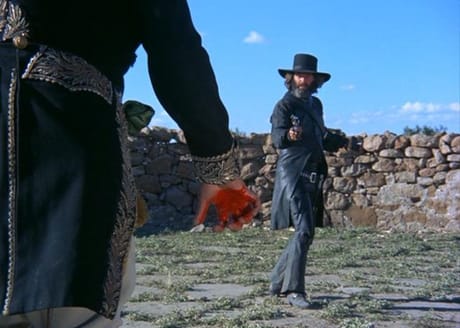Alejandro Jodorowsky's El Topo (1970) is credited as being the first "Midnight Movie," and while not the best film-to-get-high-to of its era, it may be the most epitomic: it has the dream-logic of Eraserhead, the anti-establishment anger of Pink Flamingos, the absurd humour of Rocky Horror, the ultra-violence of Sam Peckinpah and the sexual and religious overtones of a European art film. Bolstered by a John Lennon/Yoko Ono endorsement, Jodorowsky's flamboyantly weird post-western about a Clint Eastwood-type lone wanderer, his spiritual rebirth and a whole lot of blood ran at the same NYC theatre for over a year, but according to Midnight Movie connoisseur J. Hoberman's 2006 review, "Repeat the mantra 'far fucking out' all you like but to fully appreciate the thing that is El Topo you'd have to have been there 36 years ago, in the wee hours of the morning, stoned out of your guard." So, how does it look another five years later for its first Blu-Ray release? Well, I suspect El Topo works as well as it always has, which is to say, your mileage may vary. Surrealist art has a tendency to either strike you directly and powerfully, if you share the artist's obsessions, or leave you emphatically cold, if you do not. I've seen it twice now and in both viewings the first hour lulls me into a reverie through the power of Jodorowsky's often beautiful, sometimes grotesque images: his deep-focus compositions, with characters, animals, graves and corpses scattered throughout the frame, often highlighted by red bursts of blood; Jodorowsky's lone wanderer in the middle of the endless, golden-brown deserts; Jodorowsky rising from the desert sands, having sex with a woman; and the gargoyle-like monks, bandits, prostitutes and disabled people. And then comes the second hour, when my attention increasingly drifts and I begin to sense that there isn't much beneath the surface. Is there any reason for Jodorowsky to divide the film into vaguely Biblical chapters ("Genesis," "Psalms," etc.) or are these just empty signifiers? Is there any reason for several homosexual bandits to slow-dance with monks or is this just empty provocation? Why do we see another bandit pick up, then passionately kiss, a shoe? (Well, actually, Jodorowsky explains this is a reference to Luis Bunuel's alleged shoe fetish in his commentary, a case in which homage ventures too far into inside-joke territory). "I love everything that is not normal," Jodorowsky says in the extras, in a statement that I fear epitomizes his work's intellectual rigour (he also notes, "I fucked all the girls I wanted," in case you're curious). Still, El Topo should be seen by students of the offbeat: when you throw a lot of stuff at a wall, some of it is bound to stick and a lot of Jodorowsky's individual images have a way of lingering in your memory. Putting its minor historical significance aside, this defiantly, self-consciously odd film really is one of a kind, and on Blu-Ray it has never looked so beautiful. Special features are holdovers from the 2007 DVD release, including a short Jodorowsky interview and his amiable, chatty commentary track. Still unanswered: what did that scene where a mushroom-shaped rock spurts water from its tip symbolize? Somebody get Robert Langdon on the case.
(Anchor Bay)El Topo [Blu-Ray]
Alejandro Jodorowsky

BY Will SloanPublished Nov 17, 2016



